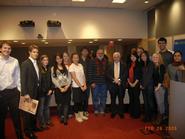
The financial crisis hit global markets hard and fast, but it would be wrong to say that no one saw it coming. On Feb. 26, NYC Program students attended a talk by a Financial Times journalist who saw dark clouds approaching long before an unprecedented ice storm froze the markets. Martin Wolf, whose 2008 book Fixing Global Finance anticipated some of the causes of the crisis, discussed how the world got into such grave economic turmoil and a few scenarios on how it might get out.
Wolf's book discusses at great length the global imbalances that have resulted from free capital flows. Following the bankruptcy of many developing countries that ran balance of payments deficits, today such countries often accumulate foreign currencies as a form of insurance against default while exporting vast amounts of savings to the developed world. This strategy provides both insurance and also a boost to the nation's export sector.
According to Wolf, this ready availability of foreign credit has contributed to economic bubbles. In recent years, the United States' economic growth has largely been financed by huge amounts of foreign borrowing. Yet following the collapse of housing prices in the latest bubble and the subsequent freezing of credit markets, some trends are reversing in the face of panic. Households have stopped borrowing and now have a positive savings rate. The government plans a dramatic increase in borrowing, however, and will take the place of households.
Wolf sees three possible scenarios out of the current economic crisis. The first possibility is a swift recovery, in which oil prices fall, interest rates fall, domestic demand picks up, and confidence in the markets is restored. Wolf thinks this is not impossible, but the problem that Wolf sees in this possibility is the continued reliance on huge amounts of debt, which drove the current crisis to begin with. The second possibility is a global breakdown, in which bankruptcy and unemployment soar, fiscal policy proves ineffective, currencies suffer crises, and nations adopt new protectionist policies. Once again, this is not impossible, but Wolf believes that nations will cooperate if they face such a grim possibility. The final and most likely scenario, according to Wolf, is that we will "muddle through" the crisis slowly with falling oil prices and modest improvement in confidence and private demand.
According to Wolf, a key problem is the lack of capacity of international institutions. One solution he proposes is collective insurance from the International Monetary Fund to provide to developing countries. Although the IMF currently holds $250 billion, Wolf notes that it would require an order of magnitude more cash to be effective in discouraging developing countries from exporting too much capital. Wolf also had some specific prescriptions for China, suggesting that the nation must spend more of its capital domestically and create service-sector jobs.
Wolf's book discusses at great length the global imbalances that have resulted from free capital flows. Following the bankruptcy of many developing countries that ran balance of payments deficits, today such countries often accumulate foreign currencies as a form of insurance against default while exporting vast amounts of savings to the developed world. This strategy provides both insurance and also a boost to the nation's export sector.
According to Wolf, this ready availability of foreign credit has contributed to economic bubbles. In recent years, the United States' economic growth has largely been financed by huge amounts of foreign borrowing. Yet following the collapse of housing prices in the latest bubble and the subsequent freezing of credit markets, some trends are reversing in the face of panic. Households have stopped borrowing and now have a positive savings rate. The government plans a dramatic increase in borrowing, however, and will take the place of households.
Wolf sees three possible scenarios out of the current economic crisis. The first possibility is a swift recovery, in which oil prices fall, interest rates fall, domestic demand picks up, and confidence in the markets is restored. Wolf thinks this is not impossible, but the problem that Wolf sees in this possibility is the continued reliance on huge amounts of debt, which drove the current crisis to begin with. The second possibility is a global breakdown, in which bankruptcy and unemployment soar, fiscal policy proves ineffective, currencies suffer crises, and nations adopt new protectionist policies. Once again, this is not impossible, but Wolf believes that nations will cooperate if they face such a grim possibility. The final and most likely scenario, according to Wolf, is that we will "muddle through" the crisis slowly with falling oil prices and modest improvement in confidence and private demand.
According to Wolf, a key problem is the lack of capacity of international institutions. One solution he proposes is collective insurance from the International Monetary Fund to provide to developing countries. Although the IMF currently holds $250 billion, Wolf notes that it would require an order of magnitude more cash to be effective in discouraging developing countries from exporting too much capital. Wolf also had some specific prescriptions for China, suggesting that the nation must spend more of its capital domestically and create service-sector jobs.
Posted March 10, 2009
